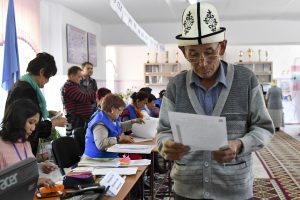In my last piece, I looked at the current state of party politics in Kyrgyzstan. Although fractionalization of the country’s dominant political forces has opened the door to lesser-known parties, the landscape ahead of parliamentary elections set for October looks more like a reshuffle of existing players under new banners rather than a radical change in the ruling class.
Politicians don’t win in a vacuum, though, and whether any of the new parties will prove viable depends on the laws that govern electoral procedures. In Kyrgyzstan, parties must pass a double threshold to gain seats in parliament: in addition to getting 0.7 percent of votes in each region, since 2017 parties need 9 percent of the national tally to make it to parliament.
When Kyrgyzstan transitioned to a proportional electoral system in 2007, a referendum established a 5 percent threshold for parties to take seats in parliament. That threshold was raised to 7 percent after the 2010 revolution, and again to 9 percent in 2017. To put this ever-increasing number in a global context, Kyrgyzstan is one of only five countries with a national threshold higher than 5 percent – the only country with a higher threshold is Turkey, where the 10 percent threshold has effectively blocked opposition parties from challenging President Recep Tayyip Erdogan’s consolidation of power.
Dinara Oshurahunova laid out the pros and cons of such a high threshold for Kyrgyzstani politics in a report for CABAR, so I won’t rehash the full debate here. Essentially, whether the 9 percent threshold is “good” comes down to tension between two issues related to representation and accountability. On the one hand, a higher threshold in theory makes for a stronger parliament vis-à-vis presidential power. Only a few parties will be able to clear the 9 percent barrier, and these will be strong enough to check an overactive president.
On the other hand, a high threshold incentivizes parties to pursue less-than-savory tactics to ensure they get enough votes to pass the hurdle. Bribes and large-scale turnout-buying already posed a problem in elections where the threshold wasn’t so high – the issue only stands to get worse in the lead up to October’s parliamentary elections.
An excessively high threshold also has implications for democratic representation. A party that gets only 8.99 percent of the national vote doesn’t get to send candidates to parliament. The way Kyrgyzstan’s electoral laws are set up means votes for parties that don’t hit the threshold are essentially thrown away and allows for the possibility of a small fraction of the population choosing national representation.
Several prominent politicians have been vocal about the threats of such a high threshold and in recent months have persistently tried to roll back the 2017 reform.
In May 2019, Onuguu-Progress leader Bakyt Torobaev proposed lowering the threshold to 5 percent. However, members of a committee that oversees constitutional legislation did not support the initiative and reaffirmed the 9 percent threshold in June.
Three more bids to lower the threshold were submitted in October 2019, proposing thresholds of 3, 5, and 7 percent. (Though Ishak Masaliev, who authored the proposal for a 3 percent threshold, almost immediately recalled his suggestion.) Parliamentarians seem to be converging behind the proposal to lower the threshold back to 7 percent, where it was before 2017. It seems as though this reform could make it past President Sooronbay Jeenbekov’s desk, given that he recently hinted his support for a 7 percent threshold.
If parliament is going to change the threshold governing October’s elections, it needs to be decided on quickly and firmly. From the perspective of party leaders, tinkering with electoral laws can be a counterproductive strategy. Take, for example, Respublika-Ata Jurt, whose politicians were vocal supporters of the 9 percent threshold, thinking it would help them concentrate power in the next parliament; now the faction is defunct, and the barrier to entry looks insurmountable for its constitutive parties.
But reform so close to elections could also have troubling implications for Kyrgyzstan’s political development. Mad dash attempts to change the rules of the game threaten to create a sense of uncertainty around electoral results, which could further weaken Kyrgyzstanis’ trust in their political system.

































